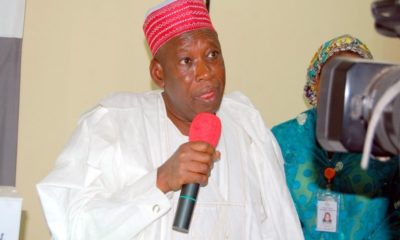Nigeria News
Salvaging Local Government System From The Brink Of Precipice
By Chukwunonso Daniel Ogbe
It is no longer news that the local government tier of government in Nigeria has been subjected to abuse by the governments of the federating states that make up Nigeria. It is doubtful if the framers of the Nigerian constitution would have conferred the power of administration of the local government councils upon the governments of the Nigerian federating states, had it been they had the inkling that the state governments will subject the exercise of that power to abuse. The unbecoming manner in which state governments interfere with the administration of the local government system, include: interfering with the funds meant for the administration of local government councils; the conduct of elections, subtly manipulated through the help of state electoral commissions; the suspension of elected local government council officials by state governors without following due process; as well as the outright refusal to conduct local government elections, without cogent reasons, among others.
Interestingly, there is an emerging development in the local government system of government, which needs to be nipped in the bud on time, lest it destroys the democratic culture which we are fighting hard to nurture as a people. The alarm being raised has to do with the demand of money from contestants taking part in local government council elections, by the state electoral bodies. Admittedly, the Nigerian Constitution empowers the state governments to make laws for the administration of the local government councils, and the power so conferred under section 7 of the Nigerian Constitution, has served as a justification for many state Houses of Assembly to embark on the journey of legislative impropriety, by compelling contestants in local government elections to pay money, before they can participate in such elections. The strange development, that is gradually becoming the norm, exists within the domain of both the ruling and opposition parties. In Enugu State for instance, section 152 (1) (f) and (g) of the Enugu State Local Government Law of 2004, empowers the Enugu State Independent Electoral Commission (ENSIEC), to collect non refundable deposits it deems fit from contestants into local government elections. Likewise, the Peoples’ Democratic Party has instituted legal action against the Edo State Independent Electoral Commission (EDSIEC), over the money collected from candidates that are participating in the local government election, scheduled to hold on 20 April, 2013.
One should sit back and appraise the harm capable of being done to our democratic culture, for the parliament to enact a law that demands money from those who are supposedly meant to serve the public. The enactment of those laws requiring that contestants in local government elections should pay money before participating in such election, is an implied admittance that politics has become a business venture in Nigeria, where people make deposits before vying for elections, only to ensure they recoup the loss incurred during electioneering period, upon assumption of office. In the case of Enugu State, contestants for chairmanship positions were asked to pay N200,000 during the 2011 local government elections, whereas the councillorship candidates were asked to pay N50, 000 as non refundable deposits. The consequences of the strange policy was well felt during the concerned election, as many people who would have participated in the election, boycotted same, because of the outrageous sums charged. The same scenario played out in the Plateau State local government election that took place in 2002. The demand of deposits from prospective contestants into the concerned local government election, based on the provision of Sections 8 and 9 of the Plateau State Local Government Electoral Law of 2002, gave rise to the case of Alliance for Democracy v. Plateau State Independent Electoral Commission ( [2004] 10 NWLR (Pt. 880), wherein the opposition appellant party challenged the action of the respondent, as being unconstitutional. Unfortunately, the Court of Appeal could not be of much help to the appellant in the suit, as the court held that the Nigerian Constitution empowers the state House of Assembly to make laws for the administration of local government, and that the Plateau State House of Assembly, by a law made in that regard, authorized the collection of deposits from contestants participating in local government council elections, which conferred the actions of the respondent with legality.
The decision of the Court of Appeal in the case of Alliance for Democracy earlier cited should be revisited when opportunity calls. In the Indian case of Maneka Gandhi v. Union of India (AIR 1978 SC 597), the Supreme Court of India, while deciding a case that had to do with the violation of the right to life and liberty of the petitioner, as provided under Article 21 of the Indian Constitution, held that any law made by the parliament must be reasonable, fair and just before same could be deemed to be a valid law. In other words, the Supreme Court of India refused to be persuaded by the argument canvassed by the government, that the travel passport of the petitioner was seized, based on the provision of a law, authorizing the seizure. The concerned impugned law empowered the government to confiscate the travel passport of any citizen of India, if it is in the interest of the public that same should be seized. Toeing the same line of judicial reasoning as did the Supreme Court of India in Maneka Gandhi’s case, one should inquire if a law that authorizes the electoral body to collect money from those willing to serve the public will be deemed to be a reasonable law. The fact that the Nigerian Constitution authorizes the state government to make laws for the administration of local government councils, does not mean that members of a House of Assembly are free to make any law they deem fit, irrespective of how unjust that law might be.
A look at the provision of Article 13 (1) of the African Charter on Human and Peoples’ Rights, will make one appreciate the fact that Nigerian citizens are empowered to participate freely in the act of governance, in accordance with the provisions of the law, and same is an enforceable fundamental right. One might argue that the concerned provision requires that the free exercise of the concerned right must be done in accordance with the provision of the law. However, one should know why the law requires that the right created under Article 13 (1) of the African Charter is to be exercised freely (emphasis added), especially when we appreciate the fact that the concerned provision of the African Charter will still be logical, if the word freely is removed from the concerned provision.
The reason the judiciary has to salvage the local government tier of government from the abuse it is being subjected to, is because those who the status quo favours, will never wish to have the concerned obnoxious provisions removed from the statute books. Moreover, if nothing is done to nip this strange development in the bud, it will not be long, and the same scenario will begin to play itself out in the course of conduct of federal elections by the Independent National Electoral Commission. There is no moral or legal justification for the demand of money from contestants participating in local government council elections, as there is budgetary allocation made for the conduct of such elections. The unjust development is only used as a tool to bully members of the opposition out of local government elections. The only effective means of checkmating the excesses going on in the local government system of government, is to get people participate effectively in local government elections. This dream of bringing governance to the grassroots cannot be achieved, when people of modest means are prevented from participating in such elections, due to laws which have turned such contests into business ventures, where deposits are made with the hope of making profit.
•Ogbe wrote from Lagos. E-mail: [email protected]
——————————————————————————————————————————————-
Posted in Nigeria News. A DisNaija.Com network.
Source: PM News
DisNaija.Com publishes regular posts on Nigeria News, Nigerian Newspapers, Online Nigeria Gist.
Follow us on Twitter and Facebook.
Your Opinion Counts. Be sure To Leave A Comment, If You Have Any.
Please Like, Share or Tweet. Your Support Is Appreciated.

Nigeria News
Kano Transfers Over 1,000 Almajiris To Different States Amidst COVID-19 Pandemic

The Kano State Government on Saturday said it has transferred 1,098 ‘almajiris’ to different states of the country.
The commissioner for local government, Murtala Garo, disclosed this while presenting a report before the state’s task force on COVID-19 at the government house, Kano.
Almajiris are children who are supposed to be learning Islamic studies while living with their Islamic teachers. Majority of them, however, end up begging on the streets of Northern Nigeria. They constitute a large number of Nigeria’s over 10 million out-of-school children.
Mr Garo said the Kano government transported 419 almajiris to Katsina, 524 to Jigawa and 155 to Kaduna. He said all of them tested negative for coronavirus before leaving the Kano State.
Despite the coronavirus test done in Kano for the almajiris, the Jigawa government earlier said it would quarantine for two weeks all the almajiris that recently arrived from Kano.
Mr Garo said another 100 almajiris scheduled to be taken to Bauchi State also tested negative to COVID-19.
In a remark, Governor Abdullahi Ganduje said the COVID-19 situation in Kano was getting worse. He appealed for a collaborative effort to curtail the spread of the virus in the state.
Mr Ganduje, who commended residents for complying with the lockdown imposed in the state, said the decision was taken to halt the spread of the virus.
Kano State, as of Saturday night, has 77 coronavirus cases, according to the Nigeria Centre for Disease Control.
The decision to transfer the Kano almajiris is part of the agreement reached between Northern governors that almajiris in each state be transferred to their states of origin.
However, even before the latest agreement by the governors, the Kano government had been transferring almajiris to other states and neighbouring countries after it banned street begging in the state, most populous in Northern Nigeria.
Despite the transfers, however, no concrete step has been taken to ensure such children do not return to Kano streets as there is freedom of movement across Nigeria although interstate travel was recently banned to check the spread of the coronavirus.
Sourced From: Premium Times Nigeria
Nigeria News
COVID-19: ‘Bakassi Boys’ Foil Attempt To Smuggle 24 Women Into Abia In Container

By Ugochukwu Alaribe
Operatives of the Abia State Vigilante Service, AVS, popularly known as ‘Bakassi Boys’ have arrested 24 market women hidden in a container truck, at Ekwereazu Ngwa, the boundary community between Abia and Akwa Ibom states.
The market women, said to be from Akwa Ibom State, were on their way to Aba, when they were arrested with the truck driver and two of his conductors for violating the lockdown order by the state government.
Driver of the truck, Moses Asuquo, claimed he was going to Aba to purchase stock fish, but decided to assist the market women, because they were stranded.
A vigilante source told Sunday Vanguard that the vehicle was impounded while the market women were sent back to Akwa Ibom State.
Commissioner for Home Land Security, Prince Dan Okoli, who confirmed the incident, said that smuggling of people into the state poses great threat to the state government’s efforts to contain the spread of COVID- 19.
Sourced From: Vanguard News
Nigeria News
Woman Kills Her Maid Over Salary Request

Operatives of the State Criminal Investigation and Intelligence Department (SCIID), Yaba of the Lagos State police command have arrested one Mrs Nene Steve for allegedly killing her maid, Joy Adole
The maid was allegedly beaten to death by Nene for requesting for her salary at their residence located at 18, Ogundola Street, Bariga area in Lagos.
Narrating the incident, Philips Ejeh, an elder brother to the deceased said that he was sad when they informed him that his sister was beaten to death.
He explained that the deceased was an indigene of Benue State brought to Lagos through an agent and started working with her as a maid in January 2020.
‘’She reported that her boss refused to pay her and anytime she asked for her salary she will start beating her.
She was making an attempt to leave the place but due to the total lockdown she remained there until Sunday when her boss said she caught her stealing noodles and this led to her serious beating and death,’’ Ejeh said.
He called on Lagos State Government and well- meaning people in the country to help them in getting justice for the victim.
The police spokesman, Bala Elkana, stated that the woman and her husband came to Bariga Police Station to a report that their house girl had committed suicide.
Detectives were said to have visited the house and suspected foul play with the position of the rope and bruises all over the body which confirmed that the girl had been tortured to death and the boss decided to hang up the girl to make it look like suicide.
He said: “The police moved on with their investigation and found a lot of sign of violence on her body that she has been tortured before a rope was put on her neck.’’
He added that the police removed the corpse and deposited it in the mortuary for autopsy to further ascertain the cause of the death.
Elkana said the matter has been transferred from Bariga police station to Panti for further investigation while the couple have been arrested and will be charged to court.
Tribune
Boko Haram Attacks: Buhari Summons Urgent Meeting Of Service Chiefs

Ostensibly alarmed by the latest killings of dozens of soldiers by Boko Haram insurgents, President Muhammadu Buhari has summoned an urgent meeting of Service Chiefs to find ways to stop the trend.
He has also dispatched the Minister of Defence, Mansur Dan Ali, to the neighbouring Republic of Chad for an urgent meeting with President Idris Deby and his defence counterpart.
Knowledgeable sources said in Abuja on Friday that the president is worried by on the deterioration of security situation on the Nigeria – Chad Border that has led to the recently increased Boko Haram terrorism in the area.
The sources which did not want to be named in Abuja said: “Nigeria has a Chad problem in the Multi-National Joint Task Force (MNJTF) put together to secure the Lake Chad basin areas and repeal the Boko Haram terrorist attacks against all the countries neighbouring the Lake.”
The sources noted that Chad is believed to be having their own internal security challenges and this has reportedly led to their pulling away their own troops manning their own border around Lake Chad, saying: “That lacuna is being exploited by the Boko Haram terrorists, who go in and out of Nigeria, Niger and Cameroon to launch terrorist acts. This is a clear illustration of the fact that terrorism is beyond national borders.”
When contacted, the Senior Special Assistant to the President on Media and Publicity, Garba Shehu, confirmed that the Defence Minister is going to Chad but said he is unaware of the purpose.
Meanwhile, the military authorities are said to be in the process of identifying the families of the latest victims with a view to making contact with them.
Credible sources revealed that it is the reason the president is yet to make any pronouncement on the matter.
“The President has called an urgent meeting with the Service Chiefs, as well as the fact that families of the latest victims of the Boko Haram are being identified and contacts made before a government pronouncement on the tragic attacks. This, it is understood, is the reason for the silence of the government over the incident,” the source said.
Sourced From: Tribune




















